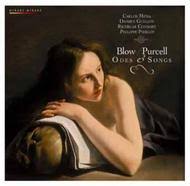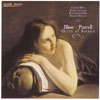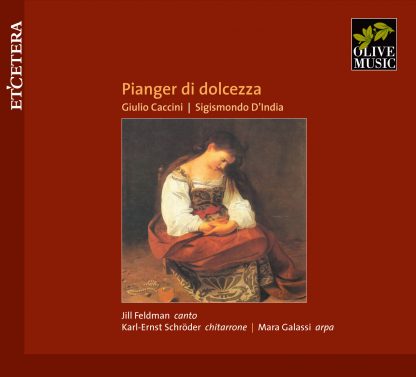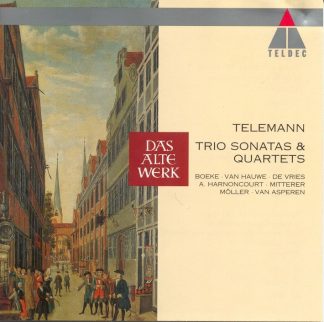Description
+Ricercar, Carlos Mena, Damien Guillon, Philippe Pierlot
Blow’s “Mark how the lark and linnet sing”, is an eloquent elegy for the late Henry Purcell, first published by Henry Playford in the June 1696 issue of The Craftsman. The melancholy ode, accompanied by only two plaintive recorders and basso continuo, has been recorded by several pairs of illustrious countertenors, and in this new version the first mournful passages force Carlos Mena and Damien Guillon to use much more chest voice than sounds convincing before they suddenly leap into falsetto mere moments later. Perhaps this confirms the wisdom of Peter Holman and his Parley of Instruments’ unique version to employ two very high tenors (Rogers Covey-Crump and Charles Daniels), which seems not only the most historically plausible solution but also the most satisfying means to navigate the extraordinary wide range demanded by Blow’s vocal writing (Hyperion, 3/93). Nevertheless, Mena and Guillon both sound entirely at ease with Dryden’s eloquent English and the musical moods to illustrate literary allusions are captured poignantly. Some of Pierlot’s tempi are a fraction fleet-footed but the recorders blend sensitively with the voices and it is a breath of fresh air to hear the simple three-piece continuo team of viol, theorbo and keyboard keeping things simple, tasteful and stylish.The remainder of this thoughtful and coherent programme is devoted to Purcell: “Here let my life” features Mena and Pierlot’s exquisite dialogue of voice and viol over a theorbo ground-bass; among the frequent reappearance of the recorders is a rendition of “Strike the viol” that feels unforced and lovely despite its quick pace. There is marvellous interplay between Mena and Guillon in the rarely performed duet “No, no resistance is but vain”, written for Thomas Southerne’s play The Maid’s Last Prayer. In recent years every disc by the Ricercar Consort has presented beguiling interpretations and there is no sign of the trend abating.





Kees Boeke –
AllMusic Review by James Manheim [-]
Give credit to countertenors Carlos Mena (from Spain) and Damien Guillon (from France): it’s very hard to tell here that you’re listening to anything other than native English speakers, and even the booklet, with full texts in English, French, and German, is not really necessary to understand the original words. The music by Blow mentioned on the cover consists only of the Ode on the Death of Mr. Henry Purcell, used here as a sort of introduction. These are fine performances of Purcell, with a program nicely divided up into songs (mostly excerpts from operas or mixed-genre semi-operas), odes (honorific pieces), and instrumental pieces, many of them excerpts from longer works. This gives a sense of why some of Purcell’s melodies are so insanely catchy: within their tuneful frameworks they cross genres. The more ceremonial odes are built up out of successions of dramatic gestures, while the songs often have intricate details that belie their simple overall forms. Mena’s rich, rounded tone is a pleasure in itself, and his duet work with Guillon is fresh and cleanly executed. The paired flutes of Belgium’s Ricercar Ensemble contribute readings that hold together well with the vocal music. Sample one of the countertenor duets, such as No, resistance is but vain (track 10), to hear the fine duet work and the expert avoidance of the cuteness factor that can ruin a Purcell recording. Over-resonant sound from a French Protestant church, the Temple de Lourmarin, detracts from the overall atmosphere.
D. Philippe
5,0 sur 5 étoiles Superbe lecture, subtile et raffinée, de Blow et Purcell
Commenté en France le 22 janvier 2011
Tout d’abord, la superbe Ode pour la mort de Henry Purcell écrite par son ami John Blow. Une superbe leçon de subtilité et de nuances nous est ici proposée avec un duo assez homognèe de contre-ténors : l’admirable Carlos Mena (vous excuserez mon côté “groupi” mais je continue à considérer Carlos Mena comme l’un des plus grand contre-ténors actuels, spécifiquement sur le répertoire sacré) et Damien Guillon. Cette ode n’a justement rien de funèbre. Elle est d’une douceur qui vous emporte de la première à la dernière note, traduisant avec finesse l’evidente affection de Blow pour Purcell. Certes, on reste dans un répertoire très intériorisé, intimiste. Mais la lumière et de belles couleurs fondues sont très bien transcrites par une intrumentation où chaque phrase est ciselée avec une précision remarquable.
Ensuite, le disque nous propose Purcell en écho de cette Ode de Blow avec une série de chansons et odes dont certaines sont particulièrement connues (ex : Strike the viol ou No, no, no, no Resistance is but Vain). Des pièces purement orchestrales émaillent cà et là le disque.
On notera dans certaines odes l’association merveilleuse des voix avec les flûtes et qui contribue à renforcer la dimension spirituelle de ces pièces (ex : la superbe Sweetness of Nature).
L’exercice est ici très délicat car il faut traduire toute la subtilité de cette écriture sans tomber dans la préciosité, la mièvrerie ou carrément l’ennui. Philippe Pierlot, par le jeu subtil des violes et le grain admirable des deux voix de deux contre-ténors, a évité cet éceuil. Attention, ce disque n’a pas pour vocation de nous charmer de façon ostentatoire et son accès peut se révéler difficile. Plusieurs écoutes permettrons de dévoiler des nuances et détails qui confirment la richesse de cette écriture des deux maîtres anglais.
Disque hautement recommandé même si je vois déjà (peut-être) certain(e)s me dire qu’il manquerait à ce disque une petite étincelle. Ils (ou elles) jugeront l’entreprise trop “sage” voire un peu trop “académique”. Je trouve tout de même que cette approche assez intériorisée, presque méditative est tout à fait défendable.